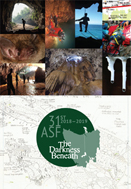Conference Proceedings
ASF Biennial Conference No 31 - 2018-19
"The Darkness Beneath"
The 31st ASF Biennial
Conference - The Darkness Beneath - was held in Devonport, Tasmania, Australia
from the 30th December 2018 to the 4th of January 2019. There were two days of
pre-conference caving and five days of post-conference caving associated with
this event. The Proceedings were produced in a digital format only.
Click Click on
the image to open the entire Conference Proceedings, or select individual papers
from the list below.

Contents of Conference
Proceedings:
Monday
Bioluminescence in cave glow-worms -
David Merritt - p.5
Naracoorte Caves: a critical window on
faunal extinctions, and past climates - Liz Reed - p.12
Seeking the Master Cave — the Junee River
Karst System - Alan Jackson - p.20
Push Day and the challenges of filming
underground - Fraser Johnston - p.21
Caves of the Western Australian Mid-West:
a brief history of human interaction - Ann-Marie Meredith -p.22
Keeping White-nose syndrome out of
Australia - Yvonne Ingeme, Peter Holz p.28
Tuesday
Wilderness wild karst in Tasmania -
Chris Sharples - p.39
Huautla — cave diving for exploration and
science in one of the world’s most spectacular deep caves - Andreas Klocker
- p.50
Slaying the Beast — mapping Kubla Khan
- Alan Jackson - p.64
The Australian Speleological Federation
Strategic Plan — 2019 to 2024 - Steve Milner - p.77
Rescue training on the North Island -
Brian Evans - p.85
Rescue training in Tasmania - Janice
March - p.92
The Midnight Hole rescue: insights into
Tasmania’s first, vertical cave rescue - Andreas Klocker - p.98
Thailand lessons symposium - Brian
Evans - p.104
Rescue in an iconic cave: the Kubla Khan
Cave Rescue, Plan V1 (2017) - Deb Hunter p.107
World Heritage values, Aboriginal
heritage and conservation, issues of the Mole Creek karst explained
- Deb
Hunter - p.108
Wednesday
Excursion
Day
Thursday
FORUM: Cave access, conservation and
management - p.110
A strategic approach to improve cave
access and conservation - Steve Milner, Stefan Eberhard and Nicholas White -
p.111
Balancing access and conservation through
collaborative relationships - Stefan Eberhard and Bronwen Prazak - p.115
Chasing mega caves in Vietnam - Alan
Jackson - p.120
Caving in the far north — the 2018 recce
to Ha Giang, Vietnam - Adam Spillane - p.122
Oxalis — commercial cave tour operator in
Vietnam - Steve Bourne - p.123
Taking the Tasmanian Cave Spider to the
world - Niall Doran - p.135
LAUNCH: Cave
Animal of the Year - Cathie Plowman and Niall Doran - p.136
Friday
Concrete derived hyper-alkaline leachate
creates calthemite straw stalactites, properties of which are compared to speleothem straws - Garry
K Smith - p.139
OzKarst and GIS — the big picture with a
Nullarbor perspective - Bob Kershaw - p.149
The collapsing Nullarbor: Weebubbie Cave
6N-2 - Norman Poulter - p.156
Bunda Cliffs — exploration update 2017
- Steven J Milner - p.166
35 years under the Nullarbor - Stefan
Eberhard - p.173
A simple field technique for measuring
streamflow and some examples from NSW and Tasmania - Henry Shannon - p.174
Unusual or isolated caves in Victoria
- Susan White - p.178
Fauna of a granite cave: first data from
Britannia Creek Cave (3GP10-48), Wesburn, Victoria, Australia - Silvana
Iannello, Penelope Greenslade, Grant Palmer - p.181
Hit or miss could mean life or death for
juvenile Southern Bent-wing Bats - Yvonne Ingeme, Amanda Bush, Lindy
Lumsden, Emmi van Harten, Steve Bourne, Terry Reardon - p.195
POSTER: Monitoring a bat maternity cave
in south-eastern Australia using remote technology
- Yvonne Ingeme, Amanda
Bush, Lindy Lumsden, Reto Zollinger - p.202
POSTER: Disturbance caused to
cave-roosting bats during ecological monitoring: implications for researchers
and cavers - Amanda Bush, Lindy Lumsden, Yvonne Ingeme, Christa Beckmann,
Peter Biro - p.203
POSTER: Caves of the Nullarbor — their
nature and setting - Henry Shannon - p.204



